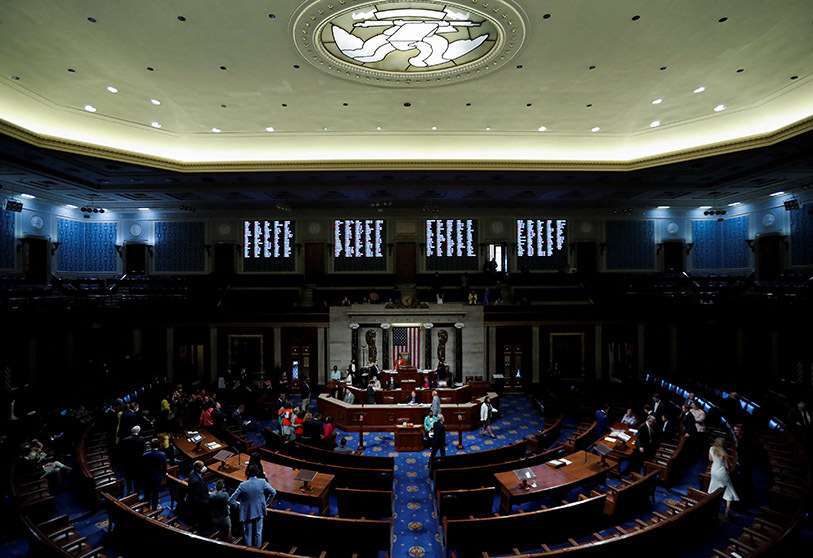Democrats soften blow in US midterms

The midterm elections in the United States pointed to a landslide victory for the Republican Party. The context could not have been more propitious in a vote that, historically, tends to disadvantage the party of the incumbent president. In this case, it was Biden's turn to take the hit at the polls, but the polls once again proved inaccurate. Far from taking advantage of runaway inflation, high crime rates and the White House's fragile appearance to advance its agenda, the GOP missed the mark and deflated expectations.
Analysts predicted a "red tide", after the Republican Party's signature colour, that would ruin the second half of Biden's first term. The Democrats, however, showed tenacity and mitigated the defeat thanks, among other factors, to the dissatisfaction of a large part of American society with the forms and candidates presented by a GOP controlled by former president Donald Trump. The Democrats focused the debate on the defence of democracy, a strategy that, once again, seems to have worked.

But the results are far from definitive. The composition of the Senate and the House of Representatives is still an unknown that will not be resolved for a few weeks. The one thing that became clear on 8 November was the deep divide in US society on civil rights, economics and values. The two Americas have yet to meet again two years after the deadly assault on the Capitol by Trump supporters.
The start of the recount gave the Democratic Party a boost. Early results promised to maintain the slim majority in the Senate and stem the bleeding of votes in the House of Representatives. However, as the count progressed, the Republicans closed the gap and widened their difference in the lower house. President Biden's party could lose Congress, directly threatening its legislative agenda.

Democrats and Republicans are tied at this hour at 48 seats in the Senate. Before the election, each controlled 50 seats, but Democrats held the majority thanks to the tie-breaking vote of Vice President Kamala Harris. In the House of Representatives, Republicans lead Democrats with 206 seats, 12 seats shy of a majority, while the Democratic Party would hold 183 seats, nine fewer than in 2020. In this House, Republicans have a clear advantage.
Projections by FiveThirtyEight, a blog specialising in polling and political analysis, suggest that Democrats are favourites to maintain their slim majority in the Senate. "As things stand, the Senate will have 48 Democrats, 47 Republicans and the occupants of five yet-to-be-projected seats in Alaska, Arizona, Georgia, Nevada and Wisconsin," the blog anticipates.
Part of the Senate victory goes to Democratic Lieutenant Governor John Fetterman, who pulled off the upset in Pennsylvania by defeating Republican candidate Mehmet Oz in a race to succeed Republican Senator Pat Toomey. His win was particularly noteworthy because Fetterman, who is on the left wing of the party, suffered a stroke a year ago that took its toll on him during the debate. Not so at the polls.

The future of the upper house now hinges on three states: Arizona, Nevada and Georgia. In Arizona, astronaut Mark Kelly leads Republican challenger Blake Masters by seven percentage points with two-thirds of the vote counted, but the Democrat is far from assured victory in a state that generally leans GOP.
In Nevada, Republican candidate Adam Laxalt leads his Democratic challenger Catherine Cortez Masto by three points with more than 80% of the vote counted. The scenario looks unfavourable, but the Clark County, Las Vegas, and mail-in ballots have yet to be counted. Although difficult, he still has a good chance.

But all eyes are on Georgia, where Democratic Senator Raphael Warnock and Republican Herschel Walker are tied with 49% of the vote. A third Libertarian candidate holds the remaining 2%, which prevents either candidate from reaching an absolute majority. As a result, the vote will go to a run-off scheduled for 6 December. This is not the first time this has happened. Georgia has seen 11 run-offs since the 1960s. In this state, the historical trend has been in favour of the Republicans.
"It's a good day for democracy and for America," said a smiling Biden on Wednesday night during a press appearance after the first results were revealed. The White House, who had warned on the campaign trail that the democratic system was at risk in these elections, called his candidates one by one, thanking them for their efforts and congratulating them on their victories. He expected a much bleaker election hangover.

Biden said he plans to run for re-election in 2024, but says he has not made a final decision. He will resolve the question early next year, although it seems that the fact that he has had the best mid-term election results for an incumbent president in two decades has given the Democratic leader and members of his administration some encouragement. The president turns 80 on 20 November.
Donald Trump, perhaps the biggest loser, has not been as fortunate. Most of the former president's nominees were defeated. Even Fox News commentators blamed Trump for the Republican Party's overall performance. The other side of the coin within the GOP was Florida Governor Ron DeSantis, who won re-election in Florida by a 19-point margin. The result puts him in the Republican leadership race for 2024.
Coordinator America: José Antonio Sierra








